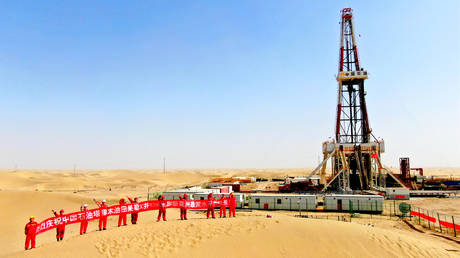
The drilling project in the oil-rich region of Xinjiang is expected to take over a year and will test advanced technologies
Chinese scientists began drilling what will be the country’s deepest borehole in the resource-rich region of Xinjiang on Tuesday, Xinhua News Agency has reported.
The drilling, conducted by China National Petroleum Corporation (CNPC), will pass through more than 10 layers of Earth’s crust, reaching the cretaceous system – a layer of rock that dates back to 145 million years ago – 10,000 meters below the surface.
The project is intended to provide information on the internal structure of the planet and provides an opportunity to test advanced deep underground drilling technologies. The site is located in the Tarim Basin area of Xinjiang in northwest China.
“The construction difficulty of the drilling project can be compared to a big truck driving on two thin steel cables,” Chinese Academy of Engineering scientist Sun Jinsheng told Xinhua. The drilling is expected to take 457 days.
While the 10,000-meter hole is extremely deep, it will fall short of the Kola Superdeep Borehole, drilled by Russia in 1989 to a depth of 12,262 meters.
Chinese President XI Jinping urged the nation’s leading scientists to further explore deep beneath Earth’s surface in a speech in 2021, with an eye toward identifying desirable mineral and energy resources as well as assessing the risk of future natural disasters.
China recently launched its first civilian astronaut into space from the Gobi Desert, according to the Xinhua report. The country plans to send astronauts to the Moon by 2030 and has already deployed a “near-Earth human space station and human round-trip transportation system,” the deputy director of the China Manned Space Agency, Lin Xiqiang, revealed on Monday.




